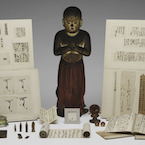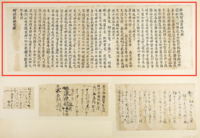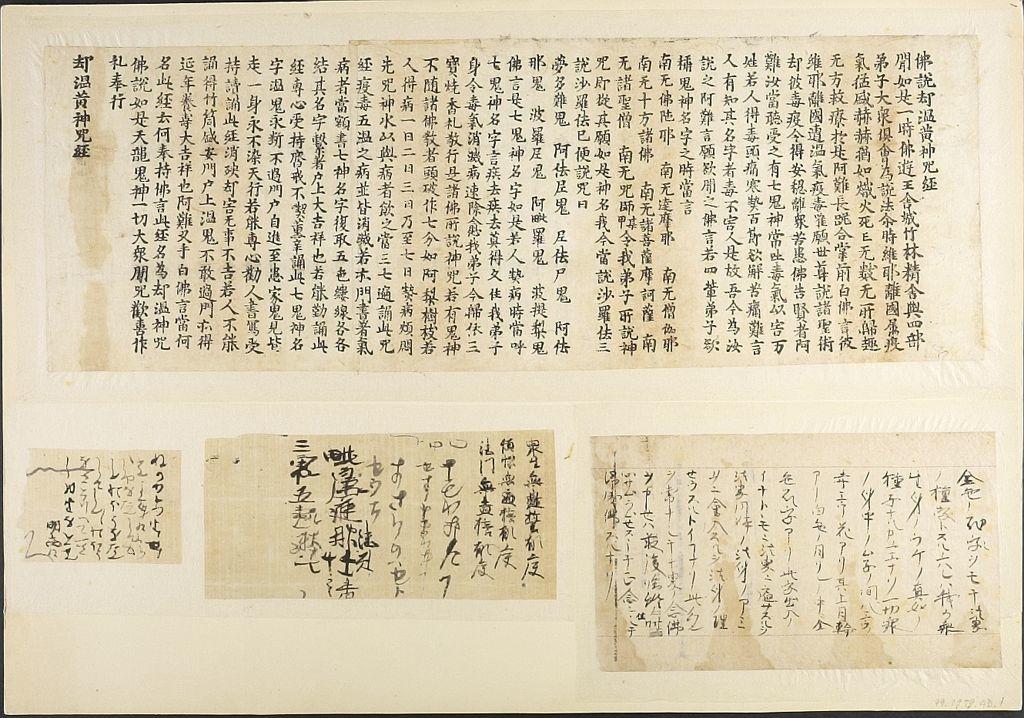I have heard thus. At one time, the Buddha traveled to Bamboo Grove Monastery in Rājagṛha in order to preach the Dharma before a great number of disciples of the four assemblies who had gathered. At that time, in the country of Vaiśālī, there just happened to be plague running rampant and spreading like wildfire. Those who had perished were countless in number and there was no end in sight and no means for treating and saving those who had been infected. Thereupon, Ānanda knelt before the Buddha with his palms together and spoke to the Buddha saying, “Vaiśālī has encountered a deadly epidemic. I only pray that the World-Honored One preach various sacred techniques to dispel their contagion and allow them to obtain peace and be free from suffering and illness. The Buddha spoke to the wise one, Ānanda, “You must listen to this. There are seven demons and they incessantly spew forth contagions and by means of this infect the myriad people. If a person contracts this contagion, he or she will have headaches and bouts of cold and fever, his or her body will long for cessation and his or her pain is difficult to express but, if a person has knowledge of that name, then the contagion will not harm him or her. For this reason, I will now preach this for your sake. Ānanda said, “Please, I desire to hear this.” The Buddha said, “When the four assemblies of disciples desire to recite the name of these demons and pacify them, then they should say,
‘I take refuge in the Buddha, I take refuge in the Dharma, I take refuge in the Sangha, I take refuge in the Buddhas from ten directions, I take refuge in all the Bodhisattvas, I take refuge in all the Arhats, I take refuge in (name of the practitioner).’
(南無仏陀耶 南無達磨耶 南無僧伽耶 南無十方諸仏 南無諸菩薩摩訶薩 南無諸聖僧 南無呪師 某甲)
Now, my disciples, this incantation that I preach is in accordance with your prayers. The name of such demons,
I will now preach to you, ‘沙羅佉.’” After having said “三説沙羅佉,” the Buddha, moreover, preached the incantation saying, “夢多難鬼、阿佉尼鬼、尼佉尸鬼、阿佉那鬼、波羅尼鬼、阿毗羅鬼、波提棃鬼.” The Buddha said, “This is the incantation of the seven demons. Their names are as such. When one has a fever or sickness, he should call the names of these seven demons and say, ‘leave immediately, leave immediately, do not stay for long’ (疾去疾去莫得久住).
As for the bodies of my disciples, the contagion will be banished and the illness will quickly leave and they will be healed. My disciples, now devote yourself to the three treasures, burn incense and prostrate, and practice this incantation of the various Buddhas. If there is a demon that does not obey the teachings of the various Buddhas, its head will split into seven parts like the branches of the arjaka tree. If a person acquires a disease, for one day, two days, three days, up to seven days, and experiences fever and anguish, first use this incantation make holy water and then give this to the sick and have them drink it, one should recite this text twenty-one times. Diseases, contagion, and epidemics will be eradicated. Also, if one sets up a gate and writes [the name of] the disease, one should write on his forehead the names of the seven demons. Again, if one takes cords of the five-colored (blue, red, white, black, yellow) threads, ties one to each of the names and connects them to the top of the gate, this will be extremely auspicious. If one diligently recites this sutra, exclusively devotes one’s heart and memorizes it, holds the lay precepts and does not imbibe vegetables with pungent smells, and recites the names of these seven demons, these demons of disease will be forever cutoff and unable to pass through the doors of the gate. If one proceeds to and enters a house that of one who is suffering from illness, the demons will encounter him or her and each and every one of them will flee leaving the body [of the inflicted] eternally free of contamination from contagious disease. If one exclusively devotes oneself to recommending this sutra to people, copies it, memorizes it and recites it, then he or she will dissipate misfortune and dispel harm. Even if there is a person who cannot recite the incantation, if they are able to place put this sutra in a tube and enshrine it above the doorway, then demons of disease will not dare to pass and, moreover, they will extend the years of their life and have great fortune.”
Ānanda put his palms together spoke to the Buddha saying, “What should I call this sutra? How should I uphold it?” The Buddha said, “This sutra’s name shall be 却温神呪.” The Buddha’s teaching was as such. The devas, nagas, demons, divinities and the entire assembly heard of this incantation and rejoiced. They prostrated, received the teaching, and put it into practice.
 By XX (Ph.D. candidate, Chinese Buddhism)
By XX (Ph.D. candidate, Chinese Buddhism)

